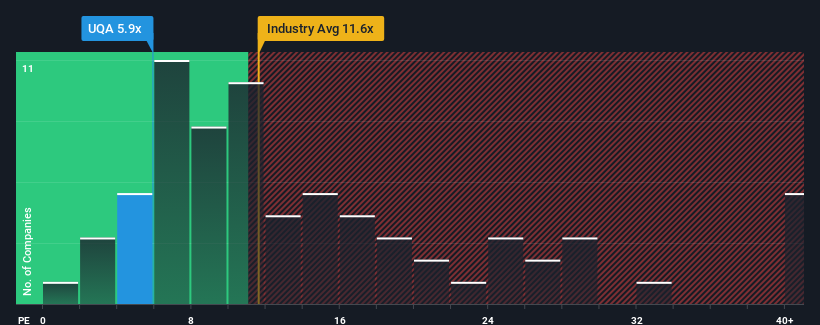Stock Analysis
Investors Aren't Entirely Convinced By UNIQA Insurance Group AG's (VIE:UQA) Earnings

When close to half the companies in Austria have price-to-earnings ratios (or "P/E's") above 9x, you may consider UNIQA Insurance Group AG (VIE:UQA) as an attractive investment with its 5.9x P/E ratio. Although, it's not wise to just take the P/E at face value as there may be an explanation why it's limited.
With earnings growth that's exceedingly strong of late, UNIQA Insurance Group has been doing very well. It might be that many expect the strong earnings performance to degrade substantially, which has repressed the P/E. If you like the company, you'd be hoping this isn't the case so that you could potentially pick up some stock while it's out of favour.
Check out our latest analysis for UNIQA Insurance Group

Is There Any Growth For UNIQA Insurance Group?
The only time you'd be truly comfortable seeing a P/E as low as UNIQA Insurance Group's is when the company's growth is on track to lag the market.
Retrospectively, the last year delivered an exceptional 34% gain to the company's bottom line. Pleasingly, EPS has also lifted 1,080% in aggregate from three years ago, thanks to the last 12 months of growth. Therefore, it's fair to say the earnings growth recently has been superb for the company.
Weighing the recent medium-term upward earnings trajectory against the broader market's one-year forecast for contraction of 0.7% shows it's a great look while it lasts.
With this information, we find it very odd that UNIQA Insurance Group is trading at a P/E lower than the market. Apparently some shareholders believe the recent performance has exceeded its limits and have been accepting significantly lower selling prices.
What We Can Learn From UNIQA Insurance Group's P/E?
Typically, we'd caution against reading too much into price-to-earnings ratios when settling on investment decisions, though it can reveal plenty about what other market participants think about the company.
We've established that UNIQA Insurance Group currently trades on a much lower than expected P/E since its recent three-year earnings growth is beating forecasts for a struggling market. There could be some major unobserved threats to earnings preventing the P/E ratio from matching this positive performance. One major risk is whether its earnings trajectory can keep outperforming under these tough market conditions. At least the risk of a price drop looks to be subdued, but investors think future earnings could see a lot of volatility.
And what about other risks? Every company has them, and we've spotted 1 warning sign for UNIQA Insurance Group you should know about.
If these risks are making you reconsider your opinion on UNIQA Insurance Group, explore our interactive list of high quality stocks to get an idea of what else is out there.
Valuation is complex, but we're helping make it simple.
Find out whether UNIQA Insurance Group is potentially over or undervalued by checking out our comprehensive analysis, which includes fair value estimates, risks and warnings, dividends, insider transactions and financial health.
View the Free AnalysisHave feedback on this article? Concerned about the content? Get in touch with us directly. Alternatively, email editorial-team (at) simplywallst.com.
This article by Simply Wall St is general in nature. We provide commentary based on historical data and analyst forecasts only using an unbiased methodology and our articles are not intended to be financial advice. It does not constitute a recommendation to buy or sell any stock, and does not take account of your objectives, or your financial situation. We aim to bring you long-term focused analysis driven by fundamental data. Note that our analysis may not factor in the latest price-sensitive company announcements or qualitative material. Simply Wall St has no position in any stocks mentioned.
About WBAG:UQA
UNIQA Insurance Group
UNIQA Insurance Group AG operates as an insurance company in Austria, and Central and Eastern Europe.
Solid track record with excellent balance sheet and pays a dividend.

